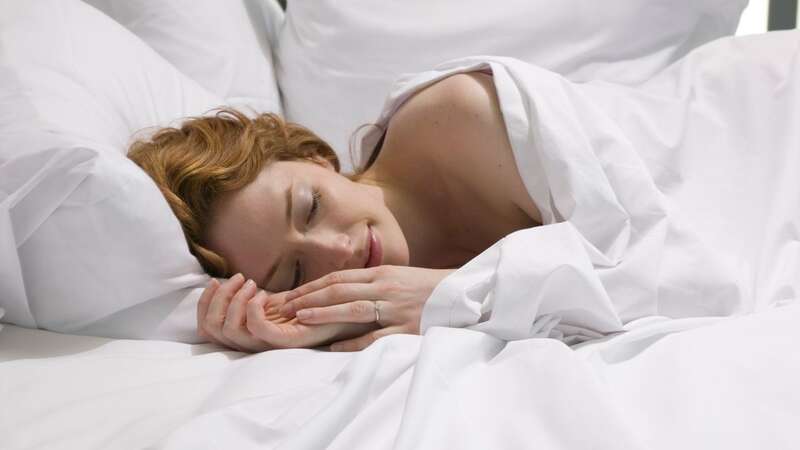Getting to sleep at night isn't always easy, and according to the NHS, one in three people will suffer from insomnia at some point in their lives.
But if you struggle to get to sleep, or you find yourself waking up in the middle of the night and staying up for hours, then there are some hacks you can try to lull yourself back to sleep in no time.
Dr Michael Mosley - who is known for being the founder of the 5:2 and Fast 800 diets - has shared his top tips for getting to sleep quickly as part of his new podcast, Sleep Well, which is aimed at adults who struggle to improve their sleep.
Each episode of the BBC Sounds podcast is designed to follow a simple, scientifically-proven technique to help you drift off, Wales Online reports, and you can read more about the five methods below.
 Dr Michael Mosley's tips could help you get to sleep (Getty Images)
Dr Michael Mosley's tips could help you get to sleep (Getty Images)1. Slow your breathing
According to Dr Mosley, one of the easiest ways to help your body drift off to sleep is by focusing on your breathing while lying in bed and making sure to take slow, deep breaths.
 Hospitals run out of oxygen and mortuaries full amid NHS chaos
Hospitals run out of oxygen and mortuaries full amid NHS chaos
The sensation of your mind racing at bedtime is caused by the locus coeruleus, which sprays a hormone known as noradrenaline - or the wake-up chemical - around your brain. And it's been proven that you can slow the spread of this hormone simply by slowing your breath, making it a great technique for promoting sleep.
Dr Mosley recommends breathing in through your nose, and out through however you are most comfortable. He also suggested breathing out for longer than you breathe in, but not to overthink it - as you'll just end up keeping yourself awake by focusing too hard on your breathing.
He added: "I recommend you try belly breathing. Put one hand on your chest, and the other just below the rib cage. As you breathe in you should feel the hand on your belly rise, while the hand on your chest remains relatively still. It's a great way to calm things right down if you're struggling to get to sleep, or have woken up with your mind racing in the middle of the night."
2. Rely on the morning light
The health expert claims that he previously suffered from insomnia himself, and the best advice he was given was to get up at the same time each day and head outside into the morning light as soon as possible.
Dr Mosley said your circadian rhythm - which is a natural internal process that regulates our sleep-wake cycle - is impacted more by the time you wake up than the time you go to bed, so keeping a strict morning routine is advised.
He explained: "A burst of morning light halts the production of the sleep hormone, melatonin, and signals to the body that the day has begun. A morning signal will kick-start a cascade of events so that around twelve hours later, melatonin starts to rise, preparing your body for deep rest."
3. Use your bed for sleeping only
It might sound counterproductive, but Dr Mosley recommends that if you wake up in the middle of the night, the best thing to do is get out of bed rather than stay under the covers.
This is designed to help your brain associate your bed with a place where sleep happens, rather than a place where you often stay awake. By getting up when you aren't falling asleep, and going to bed when you feel tired, the negative association can be broken.
Dr Mosley also urged people not to work from their bed or watch TV while snuggled under the covers, as these activities will keep the brain active and will make bad habits more likely to form.
4. Warm up to cool down
It's been widely reported that a cool bedroom can help you drift off to sleep, as a drop in body temperature can make you feel tired and can send you off to dreamland in no time.
 Mystic Mag's 2023 predictions include strikes, sleaze, self pity and separation
Mystic Mag's 2023 predictions include strikes, sleaze, self pity and separation
But if just opening your window isn't enough, there's another trick you can try - warming your body up.
According to Dr Mosley, if you take a hot bath or shower before bed, it can actually help you fall asleep faster, as soaking your body in warm water will mean that when you get out of the tub, your body temperature will drop again, making you feel sleepy.
5. Listen to your body
We all aim for eight hours of sleep, but the reality is we are all different and we may need less sleep than we think.
In the final episode of Dr Mosley's podcast, the expert speaks to Prof Nicole Tang from the University of Warwick, who explained that some people naturally need more or less sleep than others, and advised listeners to stop looking at the clock.
Dr Mosley said: "One size definitely does not fit all, your body will tell you if you are getting enough."
Read more similar news:
Comments:
comments powered by Disqus


































